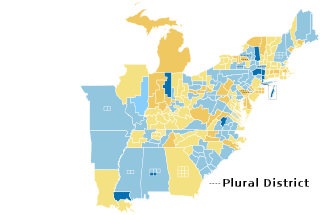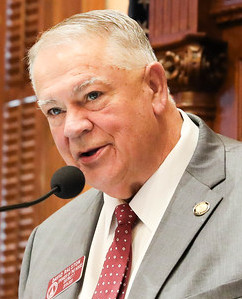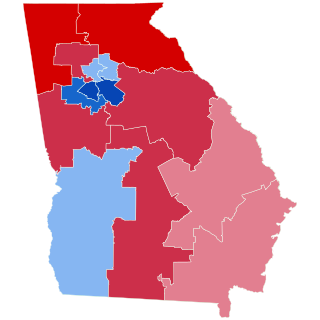A special election was held in Georgia's 2nd congressional district in 1827 to fill a vacancy caused by the resignation of John Forsyth (J).
| Elections in Georgia |
|---|
 |
A special election was held in Georgia's 2nd congressional district in 1827 to fill a vacancy caused by the resignation of John Forsyth (J).
From 1792 to 1824, Georgia had elected its representatives at-large. In 1826, for that election only, Georgia switched to using districts. In the new 2nd district, John Forsyth was re-elected to a 3rd term. Some time after the election, Forsyth resigned, having been elected Governor, and a special election was held for his replacement.
| Candidate | Party | Votes [1] | Percent |
|---|---|---|---|
| Richard Henry Wilde | Jacksonian | 4,028 | 90.8% |
| Others | 410 | 9.2% | |
Wilde took his seat on January 14, 1828 [2]

The 1972 United States Senate elections were held on November 7, with the 33 seats of Class 2 contested in regular elections. They coincided with the landslide re-election of Republican President Richard Nixon. Despite Nixon's landslide victory, Democrats increased their majority by two seats. The Democrats picked up open seats in Kentucky and South Dakota, and defeated four incumbent senators: Gordon Allott of Colorado, J. Caleb Boggs of Delaware, Jack Miller of Iowa, and Margaret Chase Smith of Maine. The Republicans picked up open seats in New Mexico, North Carolina, and Oklahoma, and defeated one incumbent, William B. Spong Jr. of Virginia.

The 1972 United States House of Representatives elections were held on November 7, 1972, to elect U.S. Representatives to serve in the 93rd United States Congress. This was the first election held after the 1970 United States redistricting cycle. It coincided with the landslide reelection victory of President Richard M. Nixon. Nixon's Republican Party managed to gain a net of twelve House of Representatives seats from the Democratic Party, although the Democrats retained a majority.

The 1868–69 United States House of Representatives elections were held on various dates in various states between June 1, 1868, and August 2, 1869. Each state set its own date for its elections to the House of Representatives before or after the first session of the 41st United States Congress convened on March 4, 1869. They coincided with the 1868 United States presidential election, which was won by Ulysses S. Grant. Elections were held for all 243 seats, representing 37 states. All of the former Confederate states were represented in Congress for the first time since they seceded from the Union.

The 1840–41 United States House of Representatives elections were held on various dates in various states between July 6, 1840, and November 2, 1841. Each state set its own date for its elections to the House of Representatives, before or after the first session of the 27th United States Congress convened on May 31, 1841. Elections were held for all 242 seats, representing 26 states.

The 1828–29 United States House of Representatives elections were held on various dates in various states between July 9, 1828, and October 5, 1829. Each state set its own date for its elections to the House of Representatives before the first session of the 21st United States Congress convened on December 7, 1829. Elections were held for all 213 seats, representing 24 states.
The 1820–21 United States House of Representatives elections were held on various dates in various states between July 3, 1820, and August 10, 1821. Each state set its own date for its elections to the House of Representatives before the first session of the 17th United States Congress convened on December 3, 1821. They coincided with President James Monroe winning reelection unopposed.

The 1792–93 United States House of Representatives elections were held on various dates in various states between August 27, 1792, and September 6, 1793. Each state set its own date for its elections to the House of Representatives before the first session of the 3rd United States Congress convened on December 2, 1793. With the addition of the new state of Kentucky's representatives, and the congressional reapportionment based on the 1790 United States census, the size of the House increased to 105 seats.
Georgia's 6th congressional district is a congressional district in the U.S. state of Georgia. As of 2023, it is represented by Republican Rich McCormick. Previously represented by Democrat Lucy McBath, the district's boundaries were redrawn following the 2020 census to be significantly more Republican-leaning than it had been in the previous decade. As a result, McBath announced that she would be running against Carolyn Bourdeaux in the Democratic primary in the neighboring 7th congressional district, which she subsequently won. Rich McCormick defeated Democrat Bob Christian for the seat in the 2022 congressional elections, took office on January 3, 2023.
Robert Pleasant Trippe was an American politician, lawyer and jurist from the state of Georgia.
B. Lee Hawkins is an American politician from Gainesville, Georgia. He is a Republican. He is a member of the Georgia House of Representatives representing the 27th district, elected in 2012. The district covers most of north Hall County and parts of White and Forsyth counties. When he announced his candidacy, he described himself as having conservative values.

The 2000 House elections in Georgia occurred on November 7, 2000 to elect the members of the State of Georgia's delegation to the United States House of Representatives. Georgia had eleven seats in the House, apportioned according to the 1990 United States census.

The 1802 United States House of Representatives elections in New York were held from April 27 to 29, 1802, to elect 17 U.S. Representatives to represent the State of New York in the United States House of Representatives of the 8th United States Congress.

Georgia's at-large congressional district special election, 1819 was called to fill a vacancy created when the former congressman was elected to the United States Senate.

The 2018 United States House of Representatives elections in Georgia were held on November 6, 2018, to elect the fourteen U.S. representatives from the state of Georgia, one from each of the state's fourteen congressional districts. The elections coincided with a gubernatorial election, as well as other elections to the House of Representatives, elections to the United States Senate, and various state and local elections. The primary elections took place on May 22, 2018.

The 2018 Georgia House of Representatives elections took place as part of the biennial United States elections. Georgia voters elected state representatives in all 180 of the state house's districts. State representatives serve two-year terms in the Georgia House of Representatives.
Sheri Smallwood Gilligan is an American politician who served in the Georgia House of Representatives for the 24th district from 2015 to 2023. Gilligan was first elected in 2015 in a special election after previous representative Mark Hamilton resigned; she beat out three other opponents to complete Hamilton's remaining 18-month term.

The 2020 United States House of Representatives elections in Georgia were held on November 3, 2020, to elect the 14 U.S. representatives from the state of Georgia, one from each of the state's 14 congressional districts. The elections coincided with the 2020 U.S. presidential election, as well as other elections to the House of Representatives, elections to the United States Senate and various state and local elections.

The 2010 Georgia State Senate elections occurred on November 2, 2010, to elect the members to the Georgia State Senate. All fifty-six seats in the state Senate and all 180 seats in the state House were up for two year terms. The winners of this election cycle served in the 151st Georgia General Assembly.

The 2010 Georgia House of Representatives elections occurred on November 2, 2010 to elect the members to the Georgia House of Representatives. All 180 seats in the state House were up for two year terms. The winners of this election cycle served in the 151st Georgia General Assembly. It was the last election to the House prior to the 2010 redistricting cycle based on the 2010 United States census.